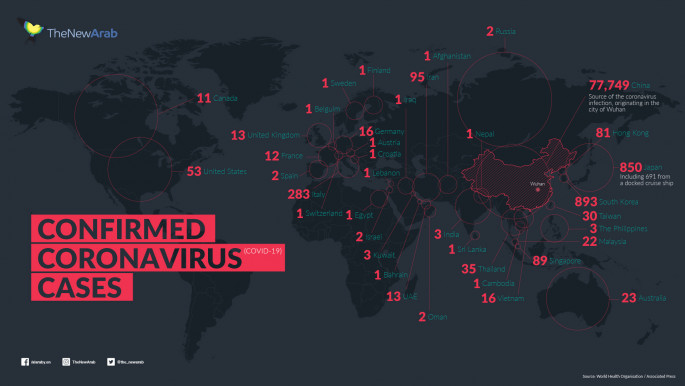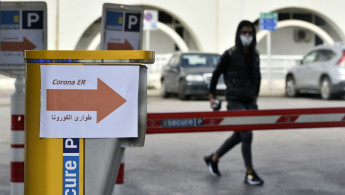Lebanon bars citizens from making pilgrimages over coronavirus fears
As the coronavirus continues to spread to parts of the Middle East, Lebanon has joined a number of countries who have halted flights to virus hot spots.
3 min read
The virus is spreading [Getty]
The Lebanese government has banned nationals from taking part in pilgrimages to Iran and other Middle Eastern countries after an explosion of fresh coronavirus cases were reported in the region.
Oman reported two new cases of the coronavirus on Tuesday, bringing the total number to four.
On the same day Iraq discovered four new cases, after one other person was reported to have contracted the disease.
Iran has 16 recorded deaths due to the virus – although this number is rising rapidly.
Iran still has the second highest number of fatalities outside of China and hosts a number of important Shia Muslim religious sites.
In a shock announcement on Tuesday, Iran's deputy health minister said he had been diagnosed with the virus.
Lebanese Muslims regularly fly to Iraq, Iran and Saudi Arabia for religious trips, including Mecca for Haj or Umrah.
Many Shia Muslims also visit Iran's holy city of Qom for pilgrimage, which is a hot spot for the virus in the region.
Last week Lebanon announced its first confirmed case of coronavirus - a 45-year-old woman who had returned to the country after visiting Iran.
Earlier this week, Tehran was forced to deny that 50 people had died from the virus in Qom, at the time saying that the death toll only stood at 13.
 |
| [Click to enlarge] |
Since then, the confirmed death toll in Iran has gone up to 16, and the number of confirmed cases stands at 95.
US Secretary of State Mike Pompeo said he's "deeply concerned" that the Iranian government have been suppressing important information about the outbreak in the country.
"The United States is deeply concerned by information indicating the Iranian regime may have suppressed vital details about the outbreak in that country," he told reporters on Tuesday.
"All nations, including Iran, should tell the truth about the coronavirus and co-operate with international aid organisations."
Iran's deputy Health Minister Iraj Harirchi has tested positive for coronavirus, who confessed to being in isolation and receiving treatment following his diagnosis.
Despite growing alarm in Iran and the Middle East, President Hassan Rouhani refused to "shut down the country" and claimed panic about the disease is an "enemy's" plot.
The coronavirus, or Covid-19 as it is called, is believed to have started in China's Wuhan and spread across Asia, Europe and the Middle East.
Symptoms of the virus vary, but it can cause pneumonia. Those who have fallen ill are reported to suffer coughs, fever and breathing difficulties. Severe cases report organ failure and death.
Antibiotics do not cure the illness, and though scientists are working on a cure, currently there is none.





 Follow the Middle East's top stories in English at The New Arab on Google News
Follow the Middle East's top stories in English at The New Arab on Google News

![Israeli forces ordered bombed Gaza's Jabalia, ordering residents to leave [Getty]](/sites/default/files/styles/image_330x185/public/2176418030.jpeg?h=a5f2f23a&itok=_YGZaP1z)
